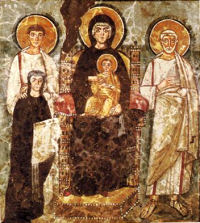
Daily Readings for:August 30, 2014
(Readings on USCCB website)
Collect: O God, who cause the minds of the faithful to unite in a single purpose, grant your people to love what you command and to desire what you promise, that, amid the uncertainties of this world, our hearts may be fixed on that place where true gladness is found. Through our Lord Jesus Christ, your Son, who lives and reigns with you in the unity of the Holy Spirit, one God, for ever and ever.
RECIPES
o White Mountain Ring with Vegetable Salad
ACTIVITIES
PRAYERS
o Prayer of the Christian Farmer and Gardener
· Ordinary Time: August 30th
· Saturday of the Twenty-First Week of Ordinary Time; St. Jeanne Jugan
Old Calendar: St. Rose of Lima, virgin; Saints Felix and Adauctus, martyrs; St. Fiacre
Today is the feast of St. Jeanne Jugan, in religion St. Mary of the Cross (1792-1879), foundress of the Little Sisters of the Poor.
Sts. Felix and Adauctus were two Roman martyrs under the Diocletian persecution. They are buried in the cemetery of Commodilla at the gates of Rome on the Ostian Way. St. Fiacre, who is in the Roman Martyrology, is from the diocese of Meaux and is the patron saint of gardeners. According to the Tridentine Calendar today is the feast of St. Rose of Lima. The General Roman Calendar now celebrates her feast on August 23.
St. Jeanne Jugan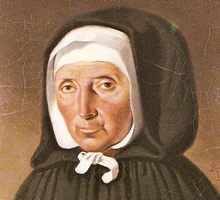 St Mary of the Cross (in the world: Jeanne Jugan) was born at Cancale, in Brittany, France, on 25 October 1792 in the turbulent period of the French Revolution. She was the sixth of eight children, four of whom died in infancy. Their fisherman father was lost at sea when Jeanne was only four. From her mother and the place of her birth, Jeanne inherited a lively, deep faith and a profound determination that could overcome any difficulty. The political climate and the family's financial plight prevented Jeanne from going to school. She learned to read and write from some ladies of the Third Order of St John Eudes who were numerous in the region.
St Mary of the Cross (in the world: Jeanne Jugan) was born at Cancale, in Brittany, France, on 25 October 1792 in the turbulent period of the French Revolution. She was the sixth of eight children, four of whom died in infancy. Their fisherman father was lost at sea when Jeanne was only four. From her mother and the place of her birth, Jeanne inherited a lively, deep faith and a profound determination that could overcome any difficulty. The political climate and the family's financial plight prevented Jeanne from going to school. She learned to read and write from some ladies of the Third Order of St John Eudes who were numerous in the region.
In Jeanne's world children began working at an early age. She would pray her Rosary while tending the herd, on the high cliffs above the Bay of Cancale. The beautiful view uplifted her soul. At the age of 15 she left home and went to work in a wealthy family not far from Cancale. With her new employer, she went to the help of the needy.
In 1801 Napoleon Bonaparte restored religious freedom and a true spiritual awakening ensued. Numerous missions were preached and it was in this fervent atmosphere that the future Foundress of the Little Sisters of the Poor heard the Lord's call.
When a young man asked for her hand in marriage she told him that God wanted her for himself, and was keeping her for a work as yet unknown. And as an immediate response she divided her clothes into two piles, leaving the prettiest to her sisters. She then left for Saint-Servan where for six years she worked as an assistant nurse. She enrolled in the Third Order of St John of Eudes. From that time her one desire was to "be as humble as Jesus".
Health problems obliged Jeanne to leave the hospital. She was taken in by a friend in the Third Order, Miss Lecoq, whom she would serve for 12 years until her death in 1835. In 1839, Jeanne was 47 years old and shared an apartment with two friends: Fanchon, 71, and Virginie Trédaniel, a 17-year-old orphan. In Saint-Servan at that time the economic situation was disastrous; 4,000 out of population of 10,000 were reduced to begging.
One winter evening in 1839, she came across a poor and blind old lady. Jeanne did not hesitate to give the lady her own bed. This was the initial spark that kindled a great blaze of charity. From that time, Jeanne was not to be deterred. In 1841 she rented a large room in which she welcomed 12 elderly people. In 1842, without money, she purchased a dilapidated convent where she soon provided 40 elderly persons with accommodation.
Encouraged by a St John of God brother, she begged for the poor in the streets and founded her institution on abandonment to Providence. In 1845 she won the Montyon Prize, awarded each year "to a poor French man or woman for outstandingly meritorious activity". She founded homes in 1846 in Rennes and in Dinan, in 1847 in Tours, and in 1850 in Angers. The Congregation spread throughout Europe, America, and Africa and shortly after her death, to Asia and Oceania.
It would seem that this fruitfulness was the result of a total and radical dispossession. In 1843, Jeanne had been re-elected Superior. Contrary to all expectations and solely on his own authority, Fr Le Pailleur, named as Superior instead Marie Jamet, who was 21 years old. In his action, Jeanne discerned God's will and supported the work, encouraging the younger sisters by her example.
In 1852, the Bishop of Rennes officially acknowledged the Congregation and appointed Fr Le Pailleur Superior General. His first act was to call Jeanne Jugan back definitively to the Motherhouse for a retirement that was to last 27 long years.
The younger sisters, ever increasing in number with the expansion of the Congregation, did not even realize that she was their Foundress. Jeanne, living in their midst, with her serenity and wisdom, transmitted a constant spirit of praise. "Love God very much; he is so good. Let us entrust ourselves to him".
She died peacefully on 29 August 1879. Her Congregation then numbered 2,400 Little Sisters in 177 homes on three continents. John Paul II beatified her on 3 October 1982.
Excerpted from the Vatican Website
Sts. Felix and Adauctus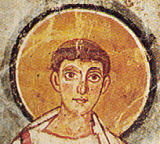 In the year 304 Felix was living piously and happily, doing the work of a Christian priest in Rome, when he was captured, along with many other Christians at the start of the persecutions under the Emperor Diocletian. First he was savagely tortured. Then he was sentenced to be beheaded, for no torture sufficed to make him give up his Christian beliefs.
In the year 304 Felix was living piously and happily, doing the work of a Christian priest in Rome, when he was captured, along with many other Christians at the start of the persecutions under the Emperor Diocletian. First he was savagely tortured. Then he was sentenced to be beheaded, for no torture sufficed to make him give up his Christian beliefs.
Felix was led to the place of execution. So noble and apparently unconcerned did he seem at the prospect of imminent death that one of the crowd who had so far kept secret his own Christianity, shouted out: 'I too follow and believe the same commandments that this man confesses. I too follow and believe in the same Jesus Christ. And I too will give away my life to further his cause.'
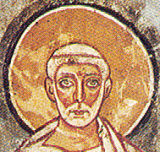 The Roman soldiers rushed to seize the man, and he too was beheaded alongside Saint Felix. Unfortunately no-one even gathered his name. He was therefore dubbed 'Adauctus', which simply means 'the additional one'.
The Roman soldiers rushed to seize the man, and he too was beheaded alongside Saint Felix. Unfortunately no-one even gathered his name. He was therefore dubbed 'Adauctus', which simply means 'the additional one'.
Both martyrs were reverently buried in the cemetery of Commodilla on the Ostian Way. By the time the list of martyrs known as the Depositio Martyrum was compiled in the year 354, they were simply known as 'Felix and Adauctus'.
About thirty years later Pope Damasus ordered that their tomb be restored and he put an inscription over it.
Excerpted from A Calendar of Saints by James Bentley
St. Fiacre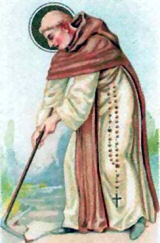 St. Fiacre (also known as Fiachra; Fiachrach; Fiacrius; Fiaker and Fevre) was a hermit at Kilfiachra, Ireland. He left to go to France, and then lived as a solitary at Breuil, Brie, on land given him by St. Faro, bishop of Meaux. Fiacre built a hospice for travelers, attracted many disciples, was known for his charity and aid to the poor, and was consulted by many for his spiritual wisdom. His miracles of healing became legendary. He is the patron saint of gardeners and the cabdrivers of Paris, whose vehicles are called fiacres, since the first coach for hire in Paris was located near the Hotel Saint-Fiacre. He is mentioned in Roman Martyrology for this day.
St. Fiacre (also known as Fiachra; Fiachrach; Fiacrius; Fiaker and Fevre) was a hermit at Kilfiachra, Ireland. He left to go to France, and then lived as a solitary at Breuil, Brie, on land given him by St. Faro, bishop of Meaux. Fiacre built a hospice for travelers, attracted many disciples, was known for his charity and aid to the poor, and was consulted by many for his spiritual wisdom. His miracles of healing became legendary. He is the patron saint of gardeners and the cabdrivers of Paris, whose vehicles are called fiacres, since the first coach for hire in Paris was located near the Hotel Saint-Fiacre. He is mentioned in Roman Martyrology for this day.
Excerpted from Dictionary of Saints, John J. Delaney
Patron: Gardeners; herbalist; florists; potters; needlemakers; cab drivers; against hemorrhoids; against syphilis; barrenness; box makers; fistula; hosiers; pewterers; taxi drivers; sterility; tile makers; against venereal disease.
Symbols: Spade and open book; rosary; birds; spade.
Often Portrayed as: man carrying a spade and a basket of vegetables beside him surrounded by pilgrims and blessing the sick.